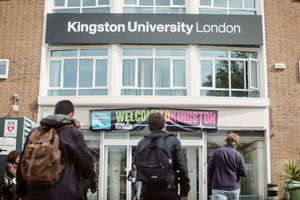Kingston University
Countries
Visitors
Visa Granted
Subjects
Kingston University – Description
Kingston University London (abbreviated KUL) is a public research university located within the Royal Borough of Kingston upon Thames, in South West London, England. Its roots go back to the Kingston Technical Institute, founded in 1899. It received university status in 1992, before which the institution was known as Kingston Polytechnic.
Kingston has over 19,000 students and a turnover of £192 million.[6] It has four campuses situated in Kingston and Roehampton. The university specialises in the arts, design, fashion, science, engineering, and business and is organised into four faculties: Kingston School of Art (KSA), Faculty of Business and Social Sciences (which combines Kingston Business School (KBS) and the School of Law, Social and Behavioural Sciences), Faculty of Health, Social Care and Education and Faculty of Science, Engineering and Computing (SEC). The Kingston Business School (KBS) is CNAA Master of Business Administration (MBA) degree approved.
Kingston is ranked 48th in the UK by The Guardian University Guide 2020 and the top 250 in the world for Business & Economics by the Times Higher Education World University Rankings 2019. In 2017, the university won The Guardian University Award for teaching excellence. Kingston is a member of the European University Association, the Association of Commonwealth Universities and University Alliance group.

campus
Penrhyn Road
This is the main university campus located close to Kingston town centre. Students based here study: Arts and Social Sciences, Civil Engineering, Computing and Information Systems and Mathematics, Earth Sciences and Geography, Statistics, Biosciences, Pharmacy, Chemistry and Pharmaceutical Science, and Radiography. Development at this site has extended it to the Learning Resources Centre. In 2015, the Union of Kingston Students, moved into the main building. Penrhyn Road also houses the refurbished Fitness Centre.
Kingston Hill
Kingston Hill mainly caters to Nursing (adult, child, mental health and learning disability), Education, Business, Music and Social Care. Before 1989, this campus was known as Gipsy Hill.
The Business School moved to a new building on the Kingston Hill Campus in 2012.
Knights Park
Located on Grange road, Knights Park campus is home to some of the students frome Kingston School of Art (KSA) – architecture an art and design students. The campus is built on the northern banks of the Hogsmill River and opened in 1939.
A 2019 £12 million refurbishment of workshops, studios and the reception area includes a gallery, a social space and an art shop.
Roehampton Vale
The Roehampton Vale campus was opened in 1993 by Sir William Barlow, the president of the Royal Academy of Engineering. The site is located on Friars Avenue, on the outskirts of Kingston. This campus is purpose-built and completely dedicated to the study of engineering (aerospace, automotive, motor vehicle and mechanical engineering).
Facilities on site include a wind tunnel, engineering workshops, a flight simulator,a range of vehicles, a Learjet 25 plan, plus automotive and aeronautical learning resources.
Reg Bailey Theatre Complex
Former church converted into the Kingston Drama students’ base, the Reg Bailey has two theatres with professional lighting and sound equipment, three rehearsal rooms and a costume room while its annexed Surrey Club is dedicated to Dance students through imposing performance studio with a state-of-the-art LED lighting system and professional sound technology, two rehearsal studios and a body conditioning room, all with fully sprung Harlequin floors. The Reg Bailey has been home to such alumni members as Ben Barnes, Sam Chan, Mandy Takhar, Alphonsia Emmanuel, Jessie Cave, Laura Harling and Trevor Eve.
Tolworth Court Sports Ground
The University’s 55-acre sports ground houses twelves football pitches, two rugby pitches, three cricket squares, one American football pitch, one lacrosse pitch, two netball courts and three tennis courts.
Kingston School of Art
Kingston School of Art (KSA) was established as part of Kingston Technical Institute founded 1899. The School of Art separated from the Technical College in 1930 and left Kingston Hall Road to move to Knights Park in 1939. It became Kingston College of Art in 1945 and merged back with the Technical College to form Kingston Polytechnic in 1970. The Polytechnic later became Kingston University in 1992, under which the school was known as the Faculty of Art, Design and Architecture (FADA) until 2017 when it reverted to its historic name. Kingston School of Art delivers undergraduate and postgraduate programmes of study across three schools:
Faculty of Business and Social Sciences
The Faculty of Business and Social Sciences combines Kingston Business School and the School of Law, Social and Behavioural Sciences.
Kingston Business School (KBS) can be traced back to the 1960s. In 1985, the CNAA approved the school’s Master of Business Administration (MBA) degree and the following year KBS moved to Kingston Hill Campus. The Business School is divided into four departments:
Faculty of Health, Social Care and Education
Founded in 1995, the Faculty of Health, Social Care and Education runs courses in education, health and social work and is a partnership between Kingston University and St George’s, University of London (SGUL). The faculty is based at Penrhyn Road, Kingston Hill and St George’s Hospital in Tooting. The School of Education joined the Faculty in 2012.
Faculty of Science, Engineering and Computing
The Faculty of Science, Engineering and Computing (SEC) was formed in 2011. The School of Geography, Geology and the Environment hosts Geographical Information Systems (GIS), which was the very first degree of its kind.[citation needed] The faculty’s teaching is split between undergraduate and postgraduate programmes. Facilities at the Roehampton Vale campus including a Learjet 25, flight simulator, wind tunnel and automotive workshops including a range of vehicles and testing facilities.
Galleries and museums
The Stanley Picker Gallery is the Faculty’s exhibition space which is now used to present a variety of research-based projects, fellowships and exhibitions. In 2003, the Stanley Picker Gallery gave birth to Transit station, which was created/curated by Stanley Picker Fellow Dagmar Glausnitzer-Smith, and former gallery curator Charles Ryder. In 2003, the Director of Foundation Studies in Art and Design, Paul Stafford, converted a run-down public convenience in Kingston town centre into the Toilet Gallery.
KEELE UNIVERSITY COURSE LIST
- Arts
- Advanced Business Administration
- Academic Studies
- Accounting – Business
- Advanced Arts & Entertainment Management
- Accounting Assistant
- Acting for Stage and Screen
- Early Childhood Care and Education
- Education Assistant
- Engineering
- Health Care Assistant
- Hotel and Resort Management
- Music
- Science
- Tourism Management
- Addictions and Mental Health
ELIGIBILITY CRITERIA IN GENERAL
COUNTRIES



